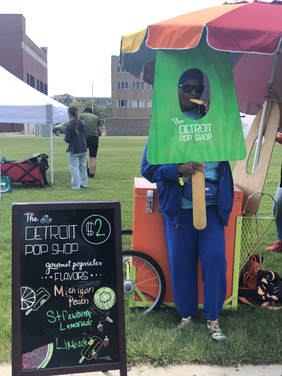Growing up, I was told to “see the glass half full” rather than half empty. However, I have always had a problem with this cliché response to my pre-adolescent complaining. My witty response would always be “I can clearly see the ratio; I cannot change what I see based on how I’m feeling.” Interestingly enough, this is one of my few pre-teen, snarky responses that I stubbornly stand by to this day.
When I approach a situation or a place, I see it for what it is, and Detroit has been no exception. Of course, I received the expected “Be careful out there!” when I mentioned my summer destination, but I did not let this, nor the themes of hopelessness broadcasted in the media discourage me from giving Detroit the benefit of the doubt.
As I landed in Detroit, I became instantly surprised at the lavish airport I hustled through. My phone storage slowly dwindled as I constantly snapped photos of Detroit’s unique architecture, murals, and historical sites. My eyes widened as I took sight of the grand General Motors complex. I evened envisioned my future self-working in Detroit’s financial district.
While I was stunned by the beauty and history seeping through the Detroit concrete, what I loved the most was the pride Detroit natives carried just for being from Detroit. I have never seen so many locals rep their city on their clothing as often as Detroiters. From the Uber driver to the cashier at Whole Foods, individuals’ faces would light up when given the chance to talk about the Motor City. As someone who has never had one city to refer to exclusively as “home,” it is refreshing to witness so much love inhabitants have for their city, no matter what they have been through.
It was not until I began working and forming deeper relationships with individuals that I began to notice another side of Detroit. Working at Detroit Food Academy, I have the opportunity to meet individuals who have gone through the nonprofit’s programs and travel to places beyond the Midtown office. After one week of “9 to 5s” and conversations with my coworkers, I became aware of Detroit’s lack of efficient public transportation, astronomically-high auto-insurance prices, police-officer shortage, and continuous gentrification.
Detroit possesses extensive history and art, yet transportation is lacking and inefficient. Detroit may have revitalized parts of its Downtown area, but many other neighborhoods are still rampant with crime and poor education.
Describing the city in such a manner is not meant to be blunt; rather it is quite hopeful. If you want the glass to be full, take it for what it is, and add more water. The same goes for Detroit.
My time here may be limited, but I hope to continue to understand the issues identified through my own experience and that of others. One of my favorite interactions thus far has been with a former DFA fellow, Desmond, who explained to Ajay and me that it wasn’t school that he hated; it was people telling him what to do. While he proceeded to drop out, he spent every subsequent day at a library, until he enrolled in a Detroit Food Academy program. This summer, I will step outside my comfort zone and allow my creativity, in coordination with my people skills and business-related knowledge to further develop the programs of Detroit Food Academy to enrich the lives of the Desmonds of Detroit and even devise my own. By no means do I think solving these issues will be easy, but a hopeful outlook to the future fueled by creativity and action is a great way to start.
What I plan to do here is simple: I will add more water.
When I approach a situation or a place, I see it for what it is, and Detroit has been no exception. Of course, I received the expected “Be careful out there!” when I mentioned my summer destination, but I did not let this, nor the themes of hopelessness broadcasted in the media discourage me from giving Detroit the benefit of the doubt.
As I landed in Detroit, I became instantly surprised at the lavish airport I hustled through. My phone storage slowly dwindled as I constantly snapped photos of Detroit’s unique architecture, murals, and historical sites. My eyes widened as I took sight of the grand General Motors complex. I evened envisioned my future self-working in Detroit’s financial district.
While I was stunned by the beauty and history seeping through the Detroit concrete, what I loved the most was the pride Detroit natives carried just for being from Detroit. I have never seen so many locals rep their city on their clothing as often as Detroiters. From the Uber driver to the cashier at Whole Foods, individuals’ faces would light up when given the chance to talk about the Motor City. As someone who has never had one city to refer to exclusively as “home,” it is refreshing to witness so much love inhabitants have for their city, no matter what they have been through.
It was not until I began working and forming deeper relationships with individuals that I began to notice another side of Detroit. Working at Detroit Food Academy, I have the opportunity to meet individuals who have gone through the nonprofit’s programs and travel to places beyond the Midtown office. After one week of “9 to 5s” and conversations with my coworkers, I became aware of Detroit’s lack of efficient public transportation, astronomically-high auto-insurance prices, police-officer shortage, and continuous gentrification.
Detroit possesses extensive history and art, yet transportation is lacking and inefficient. Detroit may have revitalized parts of its Downtown area, but many other neighborhoods are still rampant with crime and poor education.
Describing the city in such a manner is not meant to be blunt; rather it is quite hopeful. If you want the glass to be full, take it for what it is, and add more water. The same goes for Detroit.
My time here may be limited, but I hope to continue to understand the issues identified through my own experience and that of others. One of my favorite interactions thus far has been with a former DFA fellow, Desmond, who explained to Ajay and me that it wasn’t school that he hated; it was people telling him what to do. While he proceeded to drop out, he spent every subsequent day at a library, until he enrolled in a Detroit Food Academy program. This summer, I will step outside my comfort zone and allow my creativity, in coordination with my people skills and business-related knowledge to further develop the programs of Detroit Food Academy to enrich the lives of the Desmonds of Detroit and even devise my own. By no means do I think solving these issues will be easy, but a hopeful outlook to the future fueled by creativity and action is a great way to start.
What I plan to do here is simple: I will add more water.


 RSS Feed
RSS Feed
